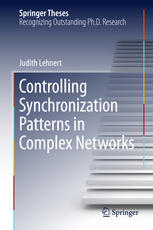

Most ebook files are in PDF format, so you can easily read them using various software such as Foxit Reader or directly on the Google Chrome browser.
Some ebook files are released by publishers in other formats such as .awz, .mobi, .epub, .fb2, etc. You may need to install specific software to read these formats on mobile/PC, such as Calibre.
Please read the tutorial at this link: https://ebookbell.com/faq
We offer FREE conversion to the popular formats you request; however, this may take some time. Therefore, right after payment, please email us, and we will try to provide the service as quickly as possible.
For some exceptional file formats or broken links (if any), please refrain from opening any disputes. Instead, email us first, and we will try to assist within a maximum of 6 hours.
EbookBell Team

4.8
24 reviewsThis research aims to achieve a fundamental understanding of synchronization and its interplay with the topology of complex networks. Synchronization is a ubiquitous phenomenon observed in different contexts in physics, chemistry, biology, medicine and engineering. Most prominently, synchronization takes place in the brain, where it is associated with several cognitive capacities but is - in abundance - a characteristic of neurological diseases. Besides zero-lag synchrony, group and cluster states are considered, enabling a description and study of complex synchronization patterns within the presented theory. Adaptive control methods are developed, which allow the control of synchronization in scenarios where parameters drift or are unknown. These methods are, therefore, of particular interest for experimental setups or technological applications. The theoretical framework is demonstrated on generic models, coupled chemical oscillators and several detailed examples of neural networks.